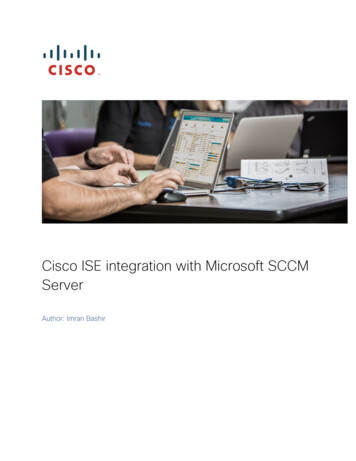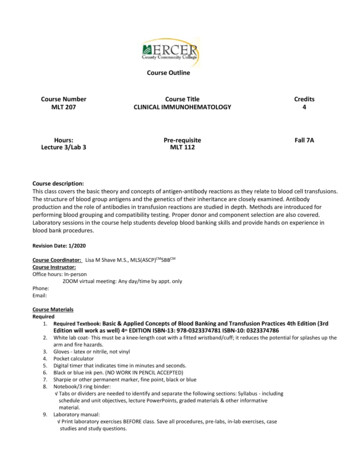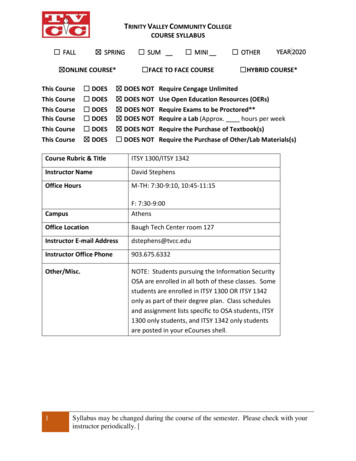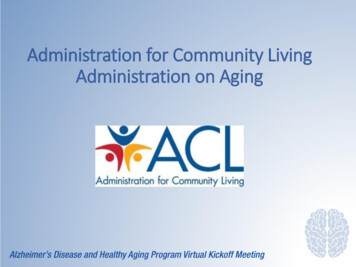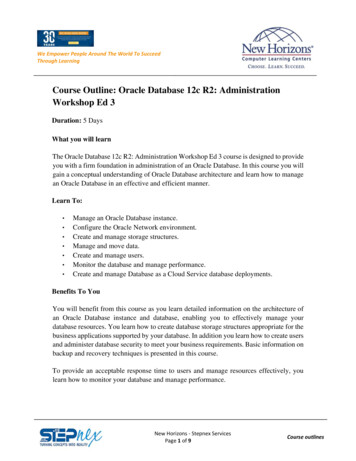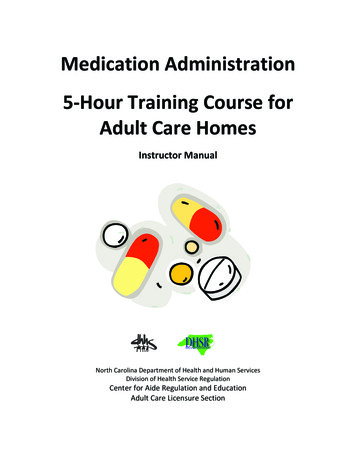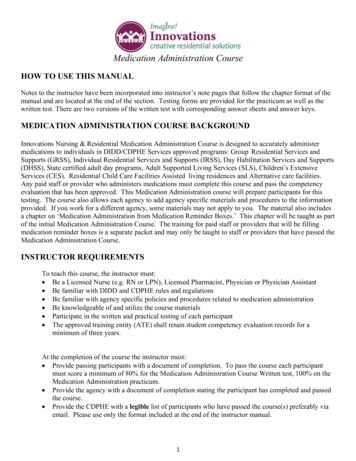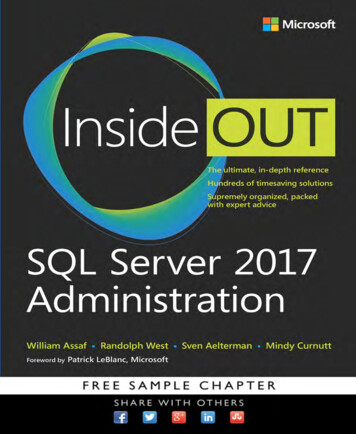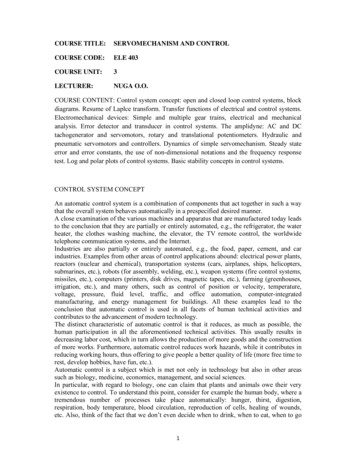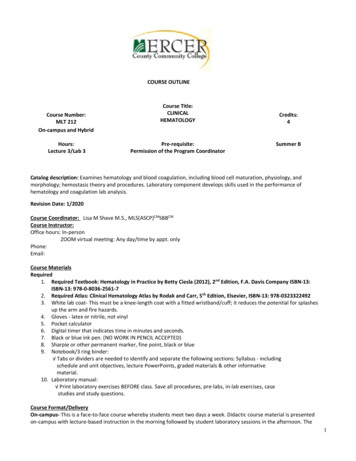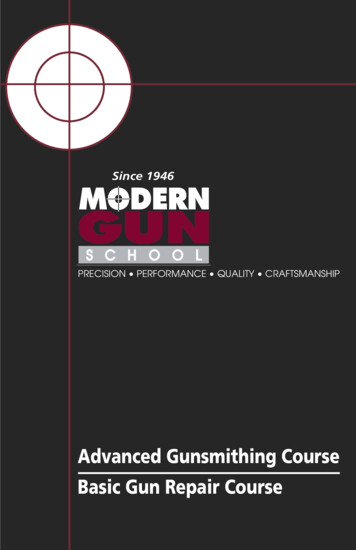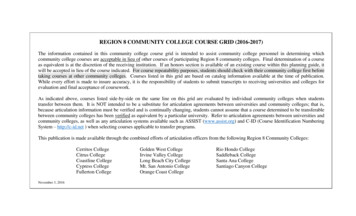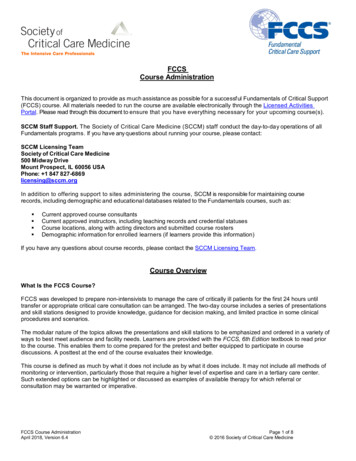
Transcription
FCCSCourse AdministrationThis document is organized to provide as much assistance as possible for a successful Fundamentals of Critical Support(FCCS) course. All materials needed to run the course are available electronically through the Licensed ActivitiesPortal. Please read through this document to ensure that you have everything necessary for your upcoming course(s).SCCM Staff Support. The Society of Critical Care Medicine (SCCM) staff conduct the day-to-day operations of allFundamentals programs. If you have any questions about running your course, please contact:SCCM Licensing TeamSociety of Critical Care Medicine500 Midway DriveMount Prospect, IL 60056 USAPhone: 1 847 827-6869licensing@sccm.orgIn addition to offering support to sites administering the course, SCCM is responsible for maintaining courserecords, including demographic and educational databases related to the Fundamentals courses, such as: Current approved course consultantsCurrent approved instructors, including teaching records and credential statusesCourse locations, along with acting directors and submitted course rostersDemographic information for enrolled learners (if learners provide this information)If you have any questions about course records, please contact the SCCM Licensing Team.Course OverviewWhat Is the FCCS Course?FCCS was developed to prepare non-intensivists to manage the care of critically ill patients for the first 24 hours untiltransfer or appropriate critical care consultation can be arranged. The two-day course includes a series of presentationsand skill stations designed to provide knowledge, guidance for decision making, and limited practice in some clinicalprocedures and scenarios.The modular nature of the topics allows the presentations and skill stations to be emphasized and ordered in a variety ofways to best meet audience and facility needs. Learners are provided with the FCCS, 6th Edition textbook to read priorto the course. This enables them to come prepared for the pretest and better equipped to participate in coursediscussions. A posttest at the end of the course evaluates their knowledge.This course is defined as much by what it does not include as by what it does include. It may not include all methods ofmonitoring or intervention, particularly those that require a higher level of expertise and care in a tertiary care center.Such extended options can be highlighted or discussed as examples of available therapy for which referral orconsultation may be warranted or imperative.FCCS Course AdministrationApril 2018, Version 6.4Page 1 of 8 2016 Society of Critical Care Medicine
What Is the Difference Between an FCCS Provider Course and an FCCS Instructor Course?The terms “FCCS provider course” and “FCCS instructor course” are mentioned in administrative documents: FCCS Provider Course – The course as described within this document.FCCS Instructor Course – The course as described within this document, presented with the instructorcurriculum that is detailed in FCCS Instructor Curriculum Document.What Is the Difference Between the Live and Online Course?Live CourseIn the live instructor-led course version of FCCS, the course director, with the assistance of the course coordinator, hasresponsibility for planning, organizing, and conducting the course. These responsibilities include faculty selection, courselogistics, obtaining equipment, establishing participant registration processes, and requesting necessary course resources(audiovisual equipment, skills station equipment, catering, etc). Provision of CE/CME credits is also a coursedirector/coordinator responsibility. All administrative responsibilities and guidelines provided in this document and othersthat are referenced apply.Online CourseThe instructor-led, online version of this program relieves the instructor of gathering students into a single classroom andproviding instruction for the many lectures required for this course. Instead the students receive links to the course hostedin the SCCM Learning Management System, where they automatically receive the pretest, view the lectures and listen toa professionally recorded version of the audio for each chapter, and interact with the program through pop quizzes andother interactive content. Students may leave and return to continue where they left off. The course director views studentprogress via an online dashboard until the student completes the lectures by taking the posttest. Pre- and posttest scoresare provided to both the student and the course director. The course director schedules in-person skill station time for thecourse. Each student then participates in the hands-on skill stations at the hosting institution. In addition, physicians,nurses, pharmacists, and respiratory therapists are eligible for continuing education (CE)/continuing medical education(CME) for their completion of the lecture portion of the program. The online version of the course greatly relieves theburden of hosting this program.Who Should Attend the Course?The course is intended for primary care physicians, emergency physicians, residents, fellows, physician assistants, nurses,and other personnel who may or may not be skilled in critical care but who must care for such patients during earlystabilization and in anticipation of the arrival of an intensivist or specialist, or pending transfer of a patient to a tertiarycenter. The curriculum may be presented in a modular format as well, which may be more appropriate for resident training.What Are the Benefits of Attending the Course?Upon completion of the FCCS course, learners will be able to: Prioritize assessment needs for the critically ill patientSelect appropriate diagnostic testsIdentify and respond to significant changes in the unstable patientRecognize and initiate management of acute life-threatening conditionsDetermine the need for expert consultation and/or patient transfer and prepare the practitioner for optimallyaccomplishing transferLearners who successfully complete the course will receive an FCCS certificate of completion.How Does a Learner Successfully Complete the Course?Successful course completion includes: Acceptable attendance during both days of the courseSatisfactory performance in the skill stationsPassing score ( 70%) on the posttest for the provider courseCompletion of the participant evaluationFCCS Course AdministrationApril 2018, Version 6.4Page 2 of 8 2016 Society of Critical Care Medicine
What Costs and Resources Are Involved in Running the FCCS Course?When purchasing a course license, SCCM will provide electronic access to presentations, skill stations, tests, andadministrative materials. The course site will also need to pay a fee for each learner, which includes a copy of thecurrent edition of the textbook and, upon successful course completion, a provider certificate. The SCCM Licensing Teamis also happy to assist with any questions. Course sites are expected to provide: Travel expenses for the course consultant and any visiting instructorsHonorarium for the course consultant, if requested (The course director may negotiate a lower or pro bono feeschedule; however, nothing higher than 1,000 is advocated by the FCCS Program Committee, SCCM Council,or SCCM Executive Office.)Comfortable conference room seating and food and beverages (for breaks and meals)Materials for learner and instructor packetsEquipment for presentation delivery, including an LCD projectorEquipment for skill stationsBecause SCCM is not directly involved in the course offering, it cannot issue continuing education (CE)/continuing medicaleducation (CME) credit to learners for live course offerings. If the institution or course sponsor is a national- or stateaccredited CE/CME provider, it may wish to grant CE/CME credit for the course.Course Preparation and DeliveryWhat Are the Steps for Preparing to Run the Course?Step 1: Submit Order for a Site LicenseThe site must place an order for a course license and the number of learners who will participate in the courseelectronically through the Licensed Activities Portal. For assistance logging in, please contact the SCCM Licensing Team.The order for the license is reviewed and approved by the SCCM Licensing Team within two weeks. Sites typically includehospitals, universities, nonprofit institutions, and SCCM-approved licensed organizations. The order is approved based onthe following criteria: Availability of course supplies and support personnelNumber of participating instructor facultyApproved course consultant (first course only, one day required)Experience of institution with earlier courses as evaluated by learnersOnce the order for a course license is approved, the site will gain access to course materials through the LicensedActivities Portal.Step 2: Set Course DatesThe site must enter course dates through the Licensed Activities Portal when submitting the order for a sitelicense. The SCCM Licensing Team will contact the site with details for posting course dates on the SCCMwebsite.The FCCS course must be held over two full days to cover all course materials. A plan to extend the courselonger than two days must be approved by the SCCM Licensing Team.An interactive brochure is available upon request. The brochure allows the site to enter information and details that arespecific to its course. If a site creates its own marketing materials for the course, SCCM must approve them beforedistribution. Please contact the SCCM Licensing Team to discuss either option.Step 3: Identify Who Will Run the CourseLicensed courses are administered and presented by a course coordinator, director, consultant (if needed),and instructors. For a detailed description of these roles, review the FCCS Faculty Continuum, included as aseparate document.FCCS Course AdministrationApril 2018, Version 6.4Page 3 of 8 2016 Society of Critical Care Medicine
It is the Course Director’s responsibility to select course instructors, which should include various healthcare professions toprovide a balanced, multiprofessional view. Physician consultant specialists (eg, cardiologists, neurologists), nurses,physician assistants, respiratory therapists, and pharmacists are all eligible to become FCCS instructors.Course Coordinator. The course coordinator will provide administrative, organizational, and other types ofsupport. There are no other requirements for the course coordinator.Course Instructors. The course must be taught by at least two FCCS-approved instructors, one of whommay be the course director. All other presenters may be clinical experts and associate instructors from avariety of areas and professions (eg, nurse, physician assistant, respiratory therapist, pharmacist, and otherphysician specialists). Skill stations may be operated by non-FCCS trained personnel, but integrity must beassured by the course director and the instructors.Course Director. The course director will apply to hold courses and ensure that they run smoothly and areconsistent with the goals, objectives, and vision of SCCM.Course Consultant. An FCCS-approved course consultant is required for first-time sites, coordinators,and directors. The consultant will provide guidance from course planning through completion—helping withorganization, administrative issues during setup, and evaluating the initial course presentation. Theconsultant may serve as an instructor but may not lead skill stations. The site is responsible for selectingthe course consultant from the FCCS Course Consultants list.Step 4: Become Familiar with MaterialsCourse Content. The SCCM Licensing Team will work with the course coordinator or director to provide FCCS, 6thEdition textbooks along with electronic access to course presentations, skill stations, and test materials. Textbookswill be mailed from the course site. All other materials are available to the site through the Licensed Activities Portal.A list of required and optional presentations and skill stations are listed below. A complete list of equipment neededfor skills stations is available as a separate document, as is a sample course agenda.PresentationsRequired: Recognition and Assessment of the Seriously Ill Patient Airway Management * Cardiopulmonary/Cerebral Resuscitation ** Diagnosis and Management of Acute Respiratory Failure Mechanical Ventilation I Mechanical Ventilation II Monitoring Oxygen Balance and Acid-Base Status Diagnosis and Management of Shock Neurologic Support Basic Trauma and Burn Support *** Acute Coronary Syndromes ** Life-Threatening Infections: Diagnosis and AntimicrobialTherapy Selection Management of Life-Threatening Electrolyte andMetabolic Disturbances Special ConsiderationsSkill StationsInclude all THREE: Mechanical Ventilation I Mechanical Ventilation II Noninvasive Positive PressureVentilationAnd choose ONE integrated station: Integrated Sepsis A Scenario Integrated Sepsis B Scenario Integrated Airway Management Hypovolemic Shock Scenario Integrated Hemorrhagic ShockScenario Integrated Traumatic Brain InjuryScenario Recognition and Assessment of theSeriously Ill PatientOptional (based on services provided at institution): Critical Care in Pregnancy Ethics in Critical Care Medicine Critical Care in Infants and Children: The Basics* May be removed if all participants are ACLS or ATLS certified.** May be removed if all participants are ACLS certified.*** May be removed if all participants are ATLS certified.FCCS Course AdministrationApril 2018, Version 6.4Page 4 of 8 2016 Society of Critical Care Medicine
Administrative Materials. Below is a complete list of the administrative materials discussed within this document. Sample Course AgendaSample Letter to Course EnrolleesSample Letter to Course InstructorsSample Attendance RosterSkill Station Attendance FormParticipant EvaluationCourse Site EvaluationStep 5: Course Preparation3 to 6 Months in AdvanceCourse Consultant (first course o
progress via an online dashboard until the student completes the lectures by taking the posttest. Pre- and posttest scores are provided to both the student and the course director. The course director schedules in-person skill station time for the course. Each student then participates in the hands-on skill stations at the hosting institution. In addition, physicians,
